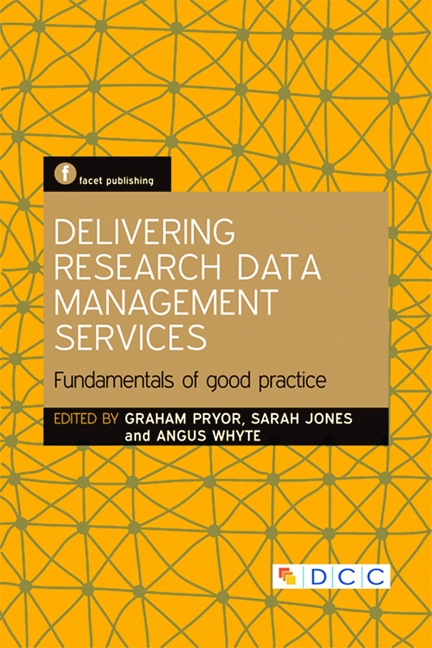Book contents
- Frontmatter
- Contents
- Preface
- Contributors
- 1 A patchwork of change
- 2 Options and approaches to RDM service provision
- 3 Who's doing data? A spectrum of roles, responsibilities and competences
- 4 A pathway to sustainable research data services: from scoping to sustainability
- 5 The range and components of RDM infrastructure and services
- 6 Case study 1: Johns Hopkins University Data Management Services
- 7 Case study 2: University of Southampton – a partnership approach to research data management
- 8 Case study 3: Monash University, a strategic approach
- 9 Case study 4: a national solution – the UK Data Service
- 10 Case study 5: development of institutional RDM services by projects in the Jisc Managing Research Data programmes
- Index
3 - Who's doing data? A spectrum of roles, responsibilities and competences
Published online by Cambridge University Press: 08 June 2018
- Frontmatter
- Contents
- Preface
- Contributors
- 1 A patchwork of change
- 2 Options and approaches to RDM service provision
- 3 Who's doing data? A spectrum of roles, responsibilities and competences
- 4 A pathway to sustainable research data services: from scoping to sustainability
- 5 The range and components of RDM infrastructure and services
- 6 Case study 1: Johns Hopkins University Data Management Services
- 7 Case study 2: University of Southampton – a partnership approach to research data management
- 8 Case study 3: Monash University, a strategic approach
- 9 Case study 4: a national solution – the UK Data Service
- 10 Case study 5: development of institutional RDM services by projects in the Jisc Managing Research Data programmes
- Index
Summary
A broad community of interest
Any institution reaching for the goal of well managed research data will, from the outset, have to consider how best to achieve a coherent association of the diverse group of actors, organizational processes and embedded systems that, once they are effectively melded together, will deliver the necessary technological and human infrastructures. In this chapter we focus on probably the greater part of this challenge, the creation and direction of a research data management (RDM) team. In practice, as with the more technical measures described in Chapters 4 and 5, it is not possible to prescribe a single and unyielding model for such an association, since it will always reflect the needs of individual organizations, cultures and traditions, yet it is feasible to describe a suite of structural components that can be used in building towards a fully functional arrangement, from which any institution may select and assemble its own approach.
The DCC Curation Lifecycle Model (Figure 3.1) provides a graphical overview of the stages involved in the successful curation and preservation of data from the point at which a research project is conceived. It is meant to assist in planning required activities so that all necessary stages in the lifecycle are managed in the correct sequence. It also provides a means of identifying the roles and responsibilities that will come into play at each of the separate stages, which as illustrated here can involve several types of actor or referral at any one time.
The term ‘data support’ is used in this diagram to describe a sometimes broad grouping of information and systems professionals, specialist administrative staff and records managers, to name only the more conspicuous elements from that cohort. Their roles will be described more explicitly in subsequent pages.
Typically, then, the responsibility for managing a Higher Education Institution's (HEI's) research data will be distributed amongst a heterogeneous range of actors situated both within and outside the institution.
- Type
- Chapter
- Information
- Delivering Research Data Management ServicesFundamentals of Good Practice, pp. 41 - 58Publisher: FacetPrint publication year: 2013
- 3
- Cited by



